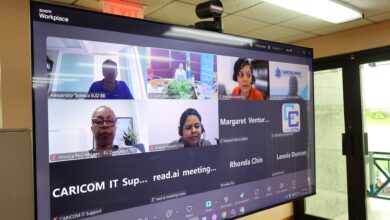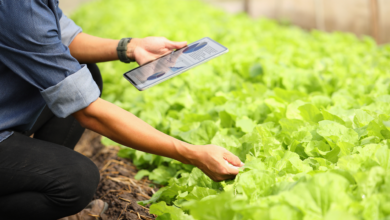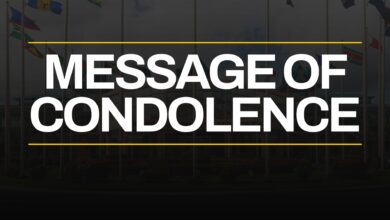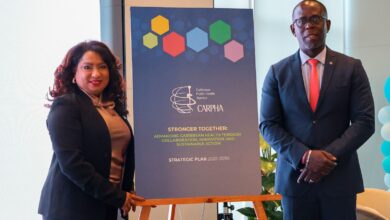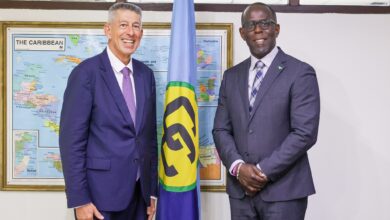(CARICOM Secretariat, Turkeyen, Greater Georgetown, Guyana) Thirty persons from CARICOM Member States recently participated in four technical sessions held during a training workshop on renewable energy technologies, in particular, solar cooling and heating systems, photovoltaics and wind energy.
The workshop, held from 9-11 May in Bridgetown, Barbados, was titled SATIS 2012: Sustainable Alternatives for Tropical Island States, a training workshop on Renewable Energy Technologies. It was hosted by the Caribbean Solar Energy Society with key sponsorship provided by the Agencia Española de Cooperación Internacional para el Desarollo (AECID) (representing the Government of Spain). SATIS 2012 was supported by the Caribbean Community (CARICOM) Secretariat, and the Organization of American States (OAS).
According to Caribbean Solar Energy Society (CSES) President, Dr. Indra Haraksingh, the aim of the SATIS series is to bring together persons interested in sustainable energy for the Caribbean region to present and discuss ongoing work in renewable energy resources and technology with relevance to the Caribbean. The first conference of the SATIS series, which was organized by the CSES), took place in Barbados in 1994. After seven conferences, eighteen years later, the meeting returned to the site of its origin.
Delivering the feature address at the Workshop’s opening ceremony, Minister in the Office of the Prime Minister with responsibility for Energy, the Honourable Senator Darcy Boyce, outlined the Government of Barbados’ plans and initiatives in keeping with its thrust towards increased deployment and use of sustainable energy. He stated that the government of Barbados aimed to increase the percentage of renewables in the energy mix to 30% within the next 30 years, primarily through waste-to-energy programmes, solar and wind energy systems. He also announced that 19 government buildings would be retrofitted for efficient energy use as well as outfitted with photovoltaic panels to demonstrate to businesses that renewable energy could be an economically feasible option.
Other initiatives which the Barbados government was considering to stimulate the use of renewables include a 50% rebate on land tax for properties used to produce energy and the development of a curriculum for certifying persons in the design and installation of renewable energy systems.
His Excellency Joaquin de Arístegui LaBorde, Ambassador of Spain to CARICOM, also addressed the Opening Ceremony. He informed the audience that Spain was one of the world’s largest investors in sustainable energy and indicated that 37 per cent of its electricity consumption was met from renewable energy sources. He noted that his country had “a wealth of experience in the most problematic areas of renewable energy: cost-effectiveness, technological challenges, and raising public awareness and acceptance of renewable energy systems”. He reaffirmed his government’s commitment to lending its expertise to countries and/or bodies within the region interested in advancing the use of renewables.
The CARICOM Secretariat was represented by Mr. Joseph Williams, Programme Manager, Energy, and the OAS by Mr. Kevin de Cuba, ECPA Caribbean Initiative Manager, Division of Energy and Climate Change Mitigation. They both brought greetings and reaffirmed their commitment to supporting capacity-building and renewable energy development at a regional level.
The workshop was especially timely, coming on the heels of the United Nations Development Programme UNDP High Level Conference of the Small Island Developing States (SIDS) on Achieving Sustainable Energy for All. Attaining the goals espoused at this meeting will depend on having a critical mass of persons trained in effective renewable energy development and utilisation.
Three of the four workshop facilitators were regional experts in their fields, while the fourth, a lecturer and expert in Solar Cooling technology, was from the Netherlands. The first and third days of the workshop took the form of plenary sessions, dealing with Solar Thermal Energy, with a focus on Solar Water Heating technology, and Solar Cooling, while on the second day, participants delved into the intricacies of their chosen form of renewable energy harvesting, photovoltaics or wind energy, looking at the resource and the technology of systems currently in use or available in the Region and prospects for the future. The workshop also included a field trip to one of Barbados’ recent photovoltaics installations at the National Oil Company’s office location.

